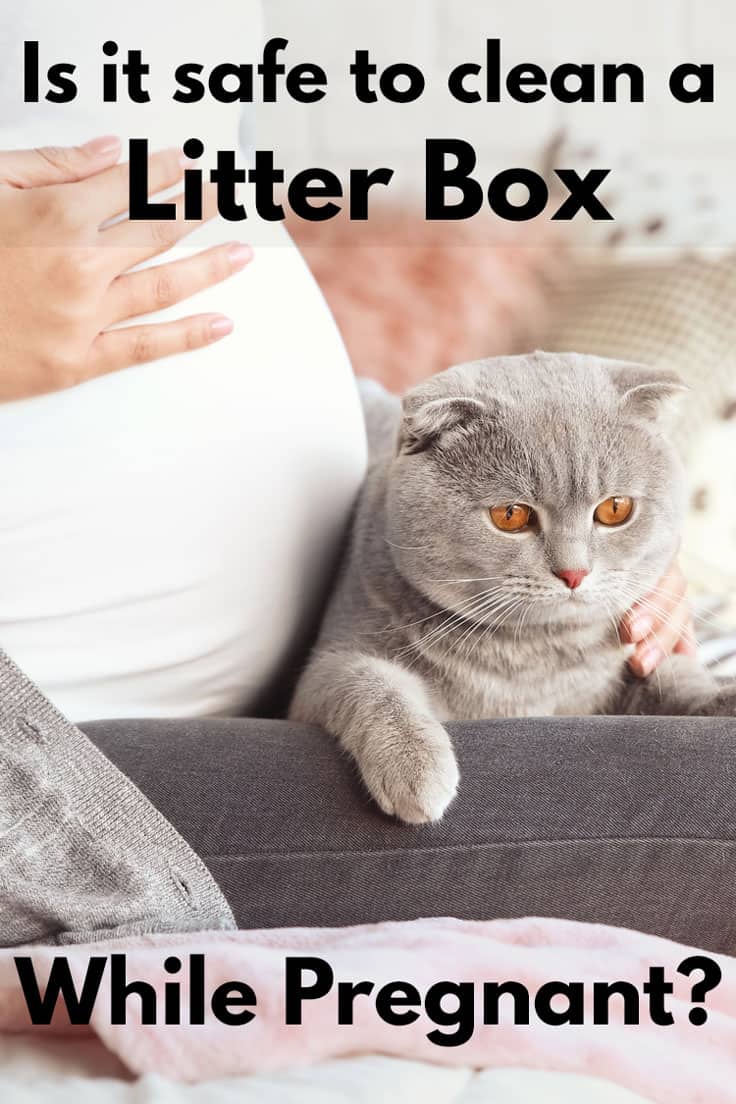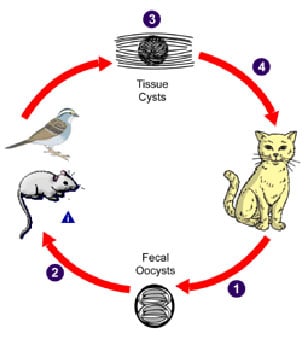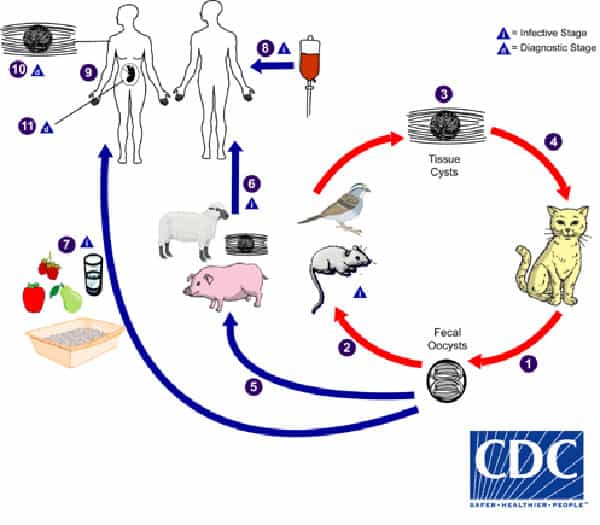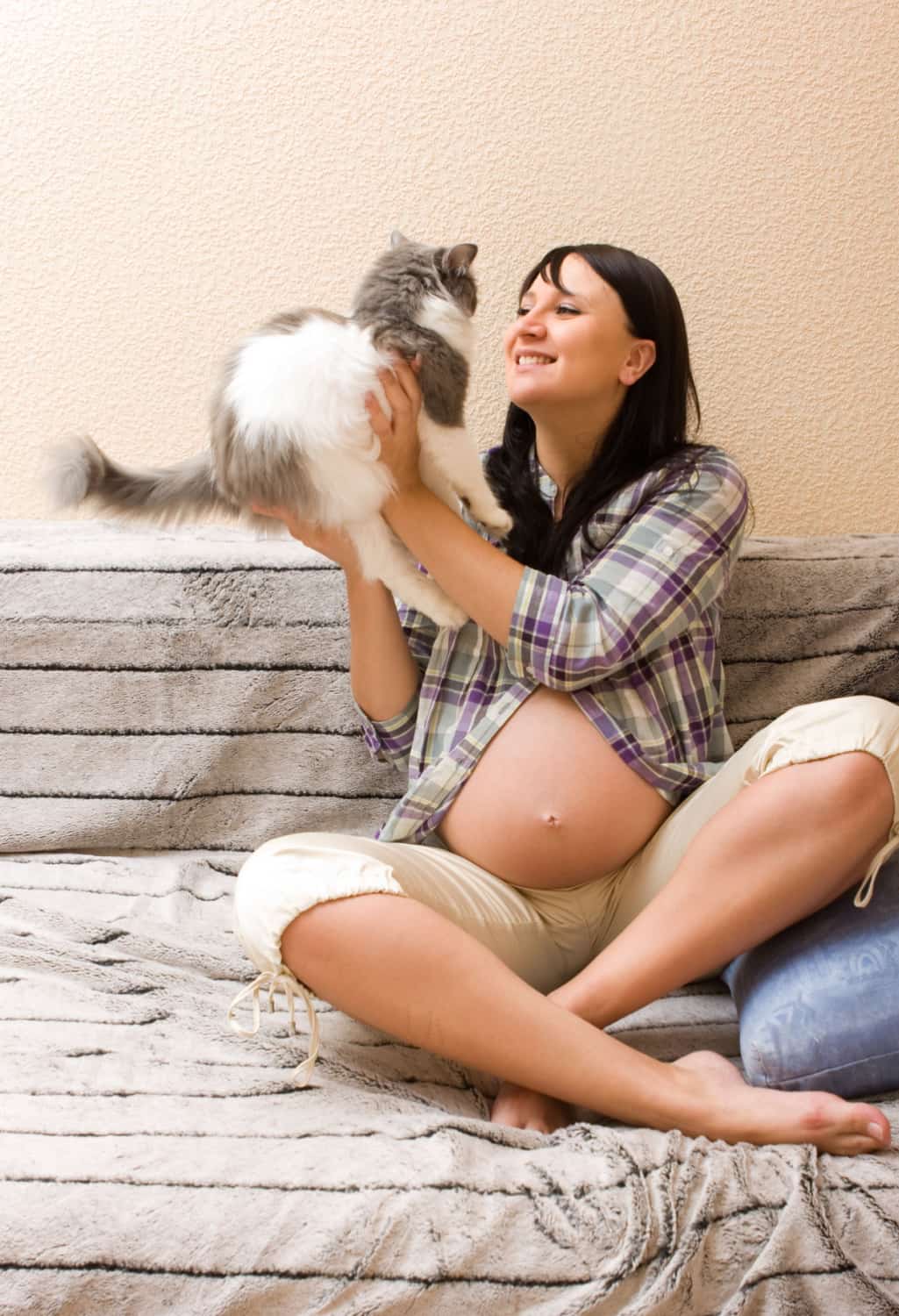Are you expecting and worried about cleaning your cat's litter box? We understand. In this article, we'll explore whether it's safe to clean a litter box while pregnant. The risk is tied to a disease known as Toxoplasmosis. Sounds scary, right?
But before you make any hasty decisions, let's get into the facts. We'll find out how often this risk actually affects pregnant women and ways to reduce it even further. Additionally, we'll discuss the ins and outs of Toxoplasmosis, how it operates, and its effect on you and your unborn baby.
We'll also lay out some simple steps to ensure your and your baby's safety while handling a litter box. No need to surrender your beloved pet out of fear. Read on to ease your concerns and learn how you can continue caring for your cat without compromising your health.
The Risk and How to Manage It
So, you love cats and you're ready to welcome a baby into your life. But there's a question lingering in your mind - is it safe for you to clean the litter box? Perhaps you're considering adopting a cat, but the uncertainty over litter box cleaning is holding you back.
Let's put your worries to rest. We've done the research and discovered the truth about managing a litter box while pregnant.
Toxoplasmosis is a disease that a pregnant woman could potentially contract. Although the risk is real, it's quite small and can be managed with some simple precautions. With the right approach, it's absolutely possible for expecting women to safely clean a litter box.
So, get comfortable and ready to dive into some crucial tips. These will help keep you and your upcoming bundle of joy safe and healthy, all while ensuring your cherished pet is well-cared for throughout your pregnancy.

Can I get sick from cleaning a litter box?
There is a lot of misunderstanding surrounding cats and pregnancy. When faced with discouraging and misleading information people sometimes end up surrendering their pets - which is totally unnecessary.
In this article, we are going to separate fact from fiction and help you clear up any concerns you might have about cleaning a litter box.
While it is true that a soon-to-be mother could get toxoplasmosis from cleaning a litter box, it is extremely uncommon. What's more - there are ways to minimize the risk even further.
We realize this sounds bad but stick with us, we promise to explain the ins and outs of this infection and discuss how you can safely care for your cat.
What is toxoplasmosis?
Toxoplasmosis is an infection caused by a parasite called Toxoplasma gondii. Sounds intimidating, right? Maybe even seems scary? Don’t panic!
While toxoplasma gondii is a parasite that can be found throughout the world, it is uncommon to contract the disease from your cat's litter box. People usually become infected from other sources - mostly handling raw meat.
Toxoplasmosis is relatively harmless for healthy adult individuals. Most people with healthy immune systems show flu-like symptoms and more likely than not, some people won’t show any symptoms at all.
When a pregnant woman catches toxoplasmosis, the infection can pass through the placenta to the fetus. When that happens, the baby can suffer from various congenital birth defects. We'll talk more about that later on.
For now, let's start an in-depth look into how toxoplasma works. Understanding the mechanism can help you assess the level of actual risk in your case.
The Toxoplasma life cycle
Toxoplasma gondii is a microscopic parasite. That means it must find hosts in order to live and propagate.
This sophisticated parasite developed a unique life cycle where felines are an obligatory host. We'll try to break it into stages here. This is what toxoplasma would "like" to ideally happen. As you'll see, people aren't really a necessary part of the loop, but felines are.
Keep in mind that this parasite evolved long before the domestication of the cat. It happens with felines across the world - not necessarily housecats.

1. Early development
The parasite develops inside a rodent or a bird. Since any animal's immune system will try to attack invaders, it hides inside small pockets it creates inside that animal's flesh. These are known as tissue cysts.
That animal seems healthy but is a carrier of the parasite.
2. Getting into a cat
A carrier bird or rodent then gets preyed on by a cat.
(Here's a crazy fact: Researchers found that the parasite can actually change the behavior of a small rodent, making it less scared of cats! In a sense, the parasite manipulates the poor critter into being eaten by a cat.)
Only once inside a cat, can it multiply and lay its "eggs" - called oocytes. So, cats are obligatory hosts for toxoplasma gondii. Without going through a cat, the parasite can't complete its life cycle.
3. Kitty is sick - and shedding
Felines - much like humans - don't always have symptoms when they have toxoplasmosis. If they do, it's those of general malaise, making it difficult for a vet to diagnose toxoplasmosis based on symptoms alone. There is a blood test that can help - but it's not always used.
Whether you're seeing symptoms or not, once a cat becomes infected, the parasite is actively multiplying in its body. Eventually, the cat's immune system catches up and stops the process.
For those few weeks after the initial infection, a cat will shed toxoplasma oocytes in the stool.
And yes, only for these few weeks following infection. Well, almost always. In some cases, the cat's immune system manages to suppress toxoplasma gondii but doesn't entirely get rid of it. It stays dormant in the cat's body.
In those cases, toxoplasmosis can rear its ugly head again, should the cat become sick and his or her immune system weakens - at any point later in life.
4. Toxoplasma finds a new host
Once shed in the stools, toxoplasma takes a few days to mature in the stools (gross, we know, but very relevant for assessing the risk). Then it's ready to invade a new host.
The cat's feces break down in the ground (remember, we're not talking housecats necessarily). The oocysts can then contaminate the food of a new mouse or bird, enter the body of that new host and so the cycle continues.
So how can Toxoplasma infect humans?
It doesn't really mean to. As far as the parasite is concerned, we're at a bit of a dead end these days, since we're extremely unlikely to be eaten by a feline.
Still, think of our ancestors in equatorial Africa. Back then, a human could very well fall prey to a lion. So toxoplasmosis evolved to try and catch a ride on humans too. And not just humans. Pretty much any mammal.
These days, according to the CDC people can become infected with toxoplasmosis when they ingest parasites from one of the following sources -
- Eating undercooked meat.
- Ingesting small amounts of undercooked meat when handling it.
- Ingesting food or water that was contaminated - at any point - by cat feces. That basically means any unwashed fruit or vegetables regardless of whether you have a cat.
- Ingesting small amounts of litter box contents of a cat.
- Through blood transfusions or organ transplants.
- In utero (fetus becoming infected from his mother).
Here's the full illustration from the CDC's website, containing both the "natural" cycle and how toxoplasma gondii invades humans -

What can I do to protect myself (and my baby) while cleaning a litter box?
There are a few simple changes you can make to ensure safe handling of your cat’s litter box which will prevent the possibility of contracting toxoplasmosis.
Have your cat checked for Toxoplasma
Your vet can test Kitty for the presence of antibodies to Toxoplasma. The type of antibodies may also help determine whether there's an active infection (which means the cat is currently shedding toxin in the feces) or not.
If your cat proves to be Toxoplasmosis-negative, then you're halfway there! Just follow the next steps to make sure Kitty doesn't become exposed and you'll be dramatically reducing the odds of you catching the disease.
Even then, taking the following simple measures related to cleaning the litter box is a good idea. Keeping good hygiene will keep you safe from infection.
Keep your cat indoors
If your cat is a natural hunter and has a hobby of bringing home mice as a gift, it might be a good idea to keep your pet indoors until after you’ve had your baby. This might be a drastic change for your cat, especially if they’re regularly outdoors. If you notice your pet is getting antsy, try playing a game with your cat by wiggling a string across the ground for them to chase!
Hunting live prey is the "classic" way for a cat to become infected with toxoplasma parasites. Prevent your cat from hunting and you'll be preventing her from catching all sorts of diseases, including this one. Salmonella, listeria, and E. coli are all infections that a cat can catch while hunting and then pass on to her human.
Don't feed your cat raw meat
You might think your cat would love a helping of steak tartar or maybe even a hearty serving of beef carpaccio. But, at least while pregnant, doctors’ orders for you are the same as your cats – no raw meat! It’s best to avoid feeding you, and your cat, undercooked or raw meat. Feed your cat commercial canned or dry food, it’s safer for both of you.
Use protective gloves when cleaning the box
Gloves can help make sure no remnants of litter stay under your nails - to later be ingested inadvertently.
A face mask isn't necessary but if you suspect your cat could currently be actively sick with toxoplasmosis, you may want to take that additional step.
You might feel silly wearing a mouth mask and latex gloves just to clean your cat's litter box, but, in the off chance your kitty cat has contracted an infection, you'll want to protect yourself from inadvertently coming in contact with their feces.
So, always take precautions when handling your cats’ poop. You can always pretend you're the top doctor on a medical TV show. "Give me a pooper scooper STAT!"
Always wash your hands immediately after cleaning the litterbox
Even if you’ve done your due diligence by wearing a face mask and latex gloves, it’s still a good practice to wash your hands once you’ve removed your protective gear. You’ll have another opportunity to ensure any eggs that could have transferred to your skin are washed off.

Clean the litter box daily
Because Toxoplasma takes more than one day to become infectious, it's essential to change your cat's litter box daily, especially if you believe your cat might be infected.
Besides, not only will changing your cat’s litter box keep you protected, your feline friend will likely thank you with extra snuggles for keeping their bathroom so clean!
Have someone else clean the litter box
If you can give up the task completely, pass the buck to someone else. While not always possible, if you have the option, request your partner, roommate, family member, or friend to change your cat’s litter box for you.
It’s best to avoid the mess, and the hassle if you can. Besides, there will likely be no other time in your pet’s life when you can shirk the responsibility and have someone else do your dirty work for you.
What can happen if a pregnant woman contracts toxoplasmosis?
Luckily, once you’ve had toxoplasmosis, you’re immune for the rest of your life. And the results of an infection in a healthy person are relatively harmless, resulting in flu-like symptoms or none at all.
But for a fetus, the effects can include birth defects, brain damage, and stillbirth. It’s important to remember, as scary as this all might sound, a pregnant woman contracting this disease is quite rare.
What's more, it's far more likely to happen from eating unwashed fruit and vegetables or handling raw meat.
The risk of contracting toxoplasmosis, which is caused by a parasitic disease, is as low as 1 in 200 women in some areas. This statistic includes those who contracted the infection through contact not only with cat feces but its other sources including raw meat, and contaminated soil.
While there is a low probability you will contract this disease, it is crucial that you take precautions.
If you suspect you may have been exposed to toxoplasmosis or other disease - for example, after inadvertently ingesting undercooked meat - talk to your doctor about it.
How to tell if your cat has toxoplasma
Symptoms of toxoplasma in cats vary. While your cat may not appear ill and you will not be able to see any signs of parasite eggs in your cat’s poop, they may be infected. If you notice your cat is experiencing the following symptoms, it’s best to contact a veterinarian to determine if your cat is infected:
- lethargic and loss of appetite
- coughing and difficulty breathing
- loose stool or diarrhea,
- eye problems or neurological problems
- change in behavior
Some cats develop an infection while others don't, but medical professionals aren’t sure of the reason.
The best thing you can do is try to keep an eye on your cat, and if they have eaten raw meat or caught a bird or mouse in your yard, it's best to utilize the precautions we mentioned above, just in case. If you have more than one cat, quarantine your sick cat to prevent them from spreading the infection to one another.
And, of course, ask your veterinarian if you’re unsure if your cat is ill or if you’re wondering what treatment options are available for your pet.
How likely are you to get sick after cleaning a litter box?
The likelihood of getting sick after cleaning your cat's litter box is very small. It's a popular myth that pregnant women will contract a disease or harm their baby if they continue to clean their pet's litter box, but in reality, more people contract toxoplasmosis from mishandling and eating raw meat than from cleaning kitty's throne.
As long as you safeguard yourself, such as wearing a mouth mask to avoid air particles and washing your hands when handling the litter box, you and your soon-to-be little one should be just fine.
Symptoms of Toxoplasmosis in Humans
According to Mayo Clinic and other sources, symptoms of toxoplasma appear within five to 20 days. People who have an uncompromised immune system may show no signs at all.
Individuals with weakened immune systems or those who are pregnant may show signs of infection. Some symptoms to keep an eye on if you believe your cat might be infected are:
- flu-like symptoms
- mild aches and pains
- enlarged lymph nodes
- headache and fever
Infants who contract the disease while in utero may show no symptoms at birth but could develop symptoms later in life including vision loss and seizures.
If you believe you might have come in contact with the toxoplasma gondii parasite, contact your physician. Your doctor may choose to run blood tests and might need to prescribe an antibiotic, it’s best to discuss any treatment options with a medical professional.

How to limit exposure to toxoplasma (nothing to do with cats!)
The myth going around about cats and pregnancy would have many believe this is the only way to contract toxoplasmosis.
However, cat litter isn’t the only way this disease can be spread. Anybody can contract the disease by improper handling of raw meat or handling contaminated soil. Some guidelines to follow are:
- Always wash and disinfect any flatware, countertops, and cutting boards that are used when preparing raw meat for cooking.
- When gardening, particularly in an area where cats might have access and may have soiled in the garden, use gardening gloves to restrict access to bacteria.
- If you have outdoor sandboxes where other children might play, cover the sandbox when they are not in use to keep cats from using it as their personal bathroom.
- Avoid eating raw mussels, clams, and oysters. The parasite that causes toxoplasmosis can live in salt water for up to seven days.
- Thoroughly clean and wash any root vegetables.
- Do not consume unpasteurized or raw milk while pregnant, including goat’s milk.
If you’re concerned or have questions about contracting toxoplasmosis, either from a cat litter box or any of those methods we outline above, please contact a medical professional for additional information.
Can the litter box smell make pregnant women sick?
If you're pregnant, you might notice your sense of smell is enhanced. Almost superhuman. If you had a superpower, you might, unfortunately, be able to smell your cat's dirty litter box from across the street.
While the smell might be unbearable, it's not actually harmful. The scent of cat urine, which is actually ammonia, can be intense on a good day. If you're finding the odor overwhelming, it might be a good idea to clean your cat's litter box daily which will help keep the smell down. Another option might be to invest in a covered litter box which may help make the scent less overpowering.
Can I still pet my cat if I’m pregnant?
You can absolutely pet your cat if you’re pregnant. Your cat may be upset if you don’t!
Cats are hygienic animals, and it's unlikely to see them rolling around in their litter box. If you have no reason to believe your cat is sick or doesn't have any feces on their fur, you should give your cat a scratch behind their ears.
If you can, ask your friends and family to pay extra attention to your pet as well! When the baby arrives, you will likely have less time to focus on your pet for a little while, so it's a great idea to have your pet used to attention from people other than you. And who are we kidding, your cat will probably love the extra snuggles.
Plus, it's excellent practice for everyone to learn how to lend a hand and work as a team before the baby arrives. It's just like they say, it takes a village!
Pregnancy can bring a lot of changes to our lives. Luckily, finding a new home for your favorite pet doesn’t have to be one of them. There are so many things we worry about before a new baby arrives, by following a few simple precautions, cleaning a litter box doesn’t need to be one of them.
We want you to know, the mark of a good pet owner is one who considers the different aspects of pet ownership, especially when it could affect various stages of your life, so kudos to you for being a great pet parent!
Additional Reading:
Can You Keep A Litter Box In Your Bedroom?



